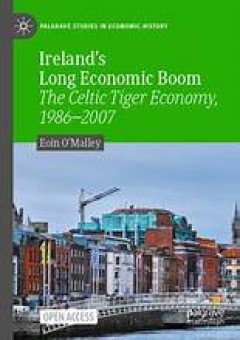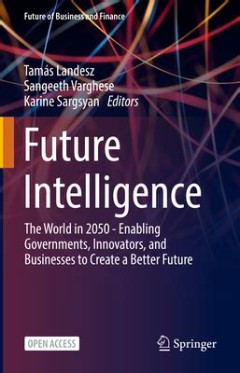Filter by

Wellbeing, Values and Lifestyles = Towards a New Development Paradigm
This open access book with contributions by leading global experts from diverse specialization defines a new development paradigm built on Lifestyle for Environment (LiFE). The volume outlines the contours of LiFE across five facets namely ethics and value system; sustainable consumption and production; modalities of systemic transformation; financing for resilient infrastructure, cities and s…
- Edition
- -
- ISBN/ISSN
- 9789819747306
- Collation
- XVIII, 314 hlm; ill., lamp.,
- Series Title
- -
- Call Number
- -

The Halal Industry in Asia = Perspectives from Brunei Darussalam, Malaysia, J…
- Edition
- -
- ISBN/ISSN
- 9789819603923
- Collation
- XXII, 420 hlm; ill., lamp.,
- Series Title
- -
- Call Number
- -
- Edition
- -
- ISBN/ISSN
- 9789819603923
- Collation
- XXII, 420 hlm; ill., lamp.,
- Series Title
- -
- Call Number
- -

Ireland's Long Economic Boom
This Open Access book examines the long economic boom experienced in Ireland between the late 1980s and 2007, analysing why this boom occurred. The book situates Ireland as a relative latecomer to economic development, with specific challenges and advantages inherent to this position. It discusses the risks involved in remaining reliant on foreign companies, exploring how in Ireland’s cas…
- Edition
- 1
- ISBN/ISSN
- 978-3-031-53070-8
- Collation
- oer.unej.ac.id
- Series Title
- 30 March 2024
- Call Number
- -

Rescaling Sustainability Transitions = Unfolding the Spatialities of Power Re…
This Open Access book explores sustainability transitions with a focus on their influence on the relationships between cores and peripheries, the rural and the urban, and the large and the small-scale. The societal changes induced by sustainability transitions are expected to assemble as a variegated and heterogeneous process reproduced by different spatial contexts and scales. Hence, the pract…
- Edition
- 1
- ISBN/ISSN
- 9783031699184
- Collation
- XVII, 299 hlm; ill., lamp.,
- Series Title
- -
- Call Number
- -

Hot Property = The Housing Market in Major Cities
Dr. Rob Nijskens Rob is an economist in the Financial Stability Division of DNB since 2012, specializing in analyzing financial stability risks in commercial and residential real estate markets. Together with Melanie Lohuis and Willem Heeringa he authored the 2017 DNB Occasional Study “The housing market in major Dutch cities”. He has also written extensively on commercial real estate, bot…
- Edition
- 1
- ISBN/ISSN
- 9783030116743
- Collation
- XVI, 221 ill; lamp
- Series Title
- -
- Call Number
- -

Development in Turbulent Times = The Many Faces of Inequality Within Europe
This open access book explores the most recent trends in the EU in terms of development, progress, and performance. Ten years after the 2008 economic crisis, and amidst a digital revolution that is intensifying the development race, the European Union, and especially Central and Eastern Europe, are ardently searching for their development priorities. Against this background, by relying on a cr…
- Edition
- 1
- ISBN/ISSN
- 9783030113612
- Collation
- VIII, 197 ill; lamp
- Series Title
- -
- Call Number
- -

Money and Debt: The Public Role of Banks
This Open Access book from the Netherlands Scientific Council for Government Policy explains how money creation and banking works, describes the main problems of the current monetary and financial system and discusses several reform options. This book systematically evaluates proposals for fundamental monetary reform, including ideas to separate money and credit by breaking up banks, introducin…
- Edition
- 1
- ISBN/ISSN
- 9783030702502
- Collation
- XII, 247 hlm,: ill, lamp;
- Series Title
- -
- Call Number
- -

Future Intelligence : The World in 2050 - Enabling Governments, Innovators, a…
The first quarter of the 21st century introduced the world to rapid uncertainty, be it the social-political and financial crises, or pandemics, or the shaking up of well-established democracies with an increasing rise in populism. At the same time, the technological promise has taken off with automation, artificial intelligence, and nanotechnologies increasingly becoming an economic reality. Th…
- Edition
- 1
- ISBN/ISSN
- 9783031363825
- Collation
- XXII, 241 hlm; ill., lamp.,
- Series Title
- -
- Call Number
- -

Megatrends in Agriculture, Food Industry and Food Markets : An Empirical and …
This book offers a research-based, holistic overview of the entire value chain of the global food industry. It captures and defines over 80 contemporary ‘megatrends’ in agriculture and the food market that can be empirically documented and have a major impact on business, economies, industries, societies, and individuals. Today the world is characterized by more uncertainty and unpredict…
- Edition
- 1
- ISBN/ISSN
- 9783031581526
- Collation
- XLV, 410 hlm; ill., lamp.,
- Series Title
- -
- Call Number
- -

Internal Migration, Urbanization and Poverty in Asia: Dynamics and Interrelat…
This book is Open Access under a CC BY license. This volume offers an essential resource for economic policymakers as well as students of development economics focusing on the interrelationships of migration, urbanization and poverty in Asia. The continent’s recent demographic transitions and rural-urban structural transformations are extraordinary, and involve complexities that require …
- Edition
- 1
- ISBN/ISSN
- 9789811315374
- Collation
- XII, 367 hlm,: ill, lamp;
- Series Title
- -
- Call Number
- -
 Computer Science, Information & General Works
Computer Science, Information & General Works  Philosophy & Psychology
Philosophy & Psychology  Religion
Religion  Social Sciences
Social Sciences  Language
Language  Pure Science
Pure Science  Applied Sciences
Applied Sciences  Art & Recreation
Art & Recreation  Literature
Literature  History & Geography
History & Geography